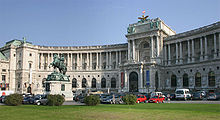Museum of Ethnology, Vienna
- Museum of Ethnology, Vienna
-
The Museum of Ethnology (German: Museum für Völkerkunde) in Vienna is the largest anthropological museum in Austria, established in 1876. It currently resides in the Hofburg Imperial Palace and houses a quarter million ethnographical and archaeological objects from Asia, Africa, Oceania, and America. Important collections include Mexican artifacts, with unique Aztec featherwork; part of James Cook's collection of Polynesia and Northwest Coast art (purchased in 1806); numerous Benin bronzes; the collection of Charles von Hügel from India, Southeast Asia, and China; the contents of a museum created to house the collections form the Austrian Brazil Expedition; artifacts collected during the circumnavigation of the globe by the SMS Novara; and two of the remaining rongorongo tablets.
The museum's most famous piece is a feathered headdress believed to have belonged to Moctezuma, the last Aztec emperor, which has created friction between the Mexican and the Austrian governments. Although taken from Mexico as war booty by the Spanish in the 16th century, Austria acquired it legally from France in 1880.
The Museum of Ethnology is not to be confused with the Austrian Folklore Museum, (the Österreichisches Museum für Volkskunde), which has a similar name in German but concentrates on European artifacts.
External links
Coordinates: 48°12′18″N 16°21′48″E / 48.205°N 16.363333333333°E / 48.205; 16.363333333333
Categories: - Museums in Vienna
- Ethnographic museums
- European museum stubs
- Austrian building and structure stubs
Wikimedia Foundation.
2010.
Look at other dictionaries:
Vienna Museum of Ethnology — The Vienna Museum of Ethnology (Museum für Völkerkunde) is the largest anthropological museum in Austria. It currently resides in the Neue Hofburg and houses a quarter million ethnographical and archaeological objects from Asia, Africa, Oceania,… … Wikipedia
Museum für Völkerkunde — or Völkerkundemuseum may refer to: Museum of Ethnology Dresden State Museum of Ethnology, Munich Museum of Ethnology, Hamburg Museum of Ethnology, Vienna This disambiguation page lists articles associated with the same title. If an … Wikipedia
Ethnology — (from the Greek ἔθνος, ethnos meaning people, nation, race ) is the branch of anthropology that compares and analyzes the origins, distribution, technology, religion, language, and social structure of the ethnic, racial, and/or national divisions … Wikipedia
Vienna — /vee en euh/, n. 1. German, Wien. a port in and the capital of Austria, in the NE part, on the Danube. 1,515,666. 2. a city in NE Virginia. 15,469. 3. a town in W West Virginia. 11,618. * * * I German Wien City (pop., 2001: 1,550,123; metro. area … Universalium
Museum — For other uses, see Museum (disambiguation). The Louvre Museum in Paris, one of the largest and most famous museums in the world … Wikipedia
Museum Godeffroy — The Museum Godeffroy was a museum in Hamburg, Germany, which existed from 1861 to 1885. The collection was founded by Johann Cesar VI. Godeffroy, who became a wealthy shipping magnate a few years after the expansion of the his trade towards… … Wikipedia
Kunsthistorisches Museum — Established 1872 1891 Location Vienna, Austria Visitor figures 559,150 (2010) … Wikipedia
ASTRA National Museum Complex — ( ro. Complexul Naţional Muzeal ASTRA ) is a museum complex in Sibiu, Romania, which gathers under the same authority four ethnology and civilisation museums in the city, a series of laboratories for conservation and research, and a documentation … Wikipedia
Mahiole — Hawaiian feather helmet Man Wearing Feather Cloak and Helmit (sic) attributed to Rembrandt Peale.[1] … Wikipedia
Cabinet of curiosities — For other uses, see Cabinet of curiosities (disambiguation). Musei Wormiani Historia , the frontispiece from the Museum Wormianum depicting Ole Worm s cabinet of curiosities. A cabinet of curiosities was an encyclopedic collection in Renaissance… … Wikipedia


